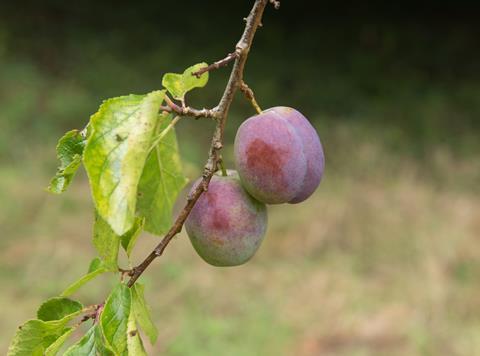Weather conditions in the south of England were ideal for cherry and plum production this year, as growers like WB Chambers step up efforts to extend the seasons

Milder, sunnier conditions have been good news for UK stonefruit production this year, even if growers remain all too aware of the dangers posed by the more frequent extremes that come with climate change.
“Unpredictability and more extreme patches of weather, even heavy rains, can affect the cherry crop, for example,” says James Miller, commercial director at family-owned WB Chambers, which produces cherries and plums, in addition to berries. “We’re very mindful of that, so we use covers and tunnels to protect our cherries, something we’ve borrowed from the berry side of the business. But generally, I think a sunnier, warmer climate is better for fruit production – this might influence our varietal portfolio in the years ahead.”
Opportunities are there for UK cherry growers, not least due to production issues experienced this season by major European producers like Turkey, Greece and Bulgaria, which were hit hard by spring frosts.
“In the UK, we had a good spring – no late frost, good light levels – and that’s made a real difference,” reveals Miller. “I think there are opportunities in a number of different areas. That broadens our ability to exploit those opportunities – whether that’s with early varieties, late varieties or even looking further afield at exports.”
Traditionally a berry grower, WB Chambers has brought much of that sector’s experience to bear on cherries. “We’re using a lot of knowledge from berry production to support the cherry crop,” says Miller. “Irrigation, polytunnels, even storage techniques. That’s allowed us to extend the season.”

In Kent, Chambers starts harvesting cherries from mid to late June, with the season typically running into August. However, through a mix of carefully selected genetics and season-extending infrastructure, the company is seeking to push the boundaries at both ends of the calendar.
“We have multiple genetic strains that give us an extended season, and we’re exploring even more options from Europe and beyond,” Miller explains. “Our owner Tim Chambers and operations director Salih Hodzhov were recently in Holland and Belgium looking at new planting structures that not only support higher class 1 yields but also make harvesting more efficient – especially important given current labour challenges.”
As something of an unpredictable crop, cherries rely heavily on good labour, with post-Brexit uncertainty over access causing headaches for UK growers. “We need clarity from government on how many years we’ll have access to the Seasonal Worker scheme,” says Miller. “There are no robotics that I’m aware of to facilitate cherry harvesting, certainly nothing currently viable, so we’ll need human pickers for a long time.”
Chambers is relying more on workers from Central Asian countries like Tajikistan and Kazakhstan, according to Miller. “Our returnee rate this year was around 94 per cent, which is incredible,” he says. “And it’s a massive help, not only in terms of integrating people into UK society, so they know how things work, where the doctors are, where the shops are, et cetera, but also in terms of training and productivity, and understanding the company culture. It’s hugely beneficial.”
Since WB Chambers grows multiple crops, pickers can count on consistent work for several months of the year. “We start harvesting crops in April, and will finish in December, so that’s at least eight months,” he says. “We would like the government to extend the Seasonal Worker scheme from six months to nine months, so it is more in line with the crops that we actually grow.”
When it comes to plums, Chambers is also scaling up, with new varieties and this year’s perfect growing conditions helping to double production from 150 tonnes in 2024 to 300 tonnes this year.
“We’ve planted new orchards and had a bumper crop this year, helped again by the weather,” Miller confirms. “We grow classic varieties like Victoria, Reeves and Jubileum, as well as newer ones like Tophit and Toptaste, which could support a more premium positioning for British plums.”
Retailers have responded well, according to Miller. “They supported us with promotions this year, which helped move the crop and brought more visibility to UK-grown plums,” he says. “Going forward, we’d like to build a more structured seasonal plan with them.”
And while domestic sales are key, exports are once again a consideration. “We exported about six years ago due to a crop failure in Belgium, and there’s no reason we couldn’t again,” says Miller. “Kent is close to the continent, and we’re working with government to streamline the export process. We think cherries – being relatively hardy – are well suited to that opportunity.”
Water management is also high on the agenda. “Water security is one of our top strategic priorities,” says Miller. “We’re investing in water capture and water storage, and we use drip irrigation and computerised systems to manage usage efficiently – again, learning from our berry side. One of our asks of the government is to streamline and simplify the planning permission process in order for us to be able to invest in these areas, in order to be able to continue producing healthy crops for the nation.”



